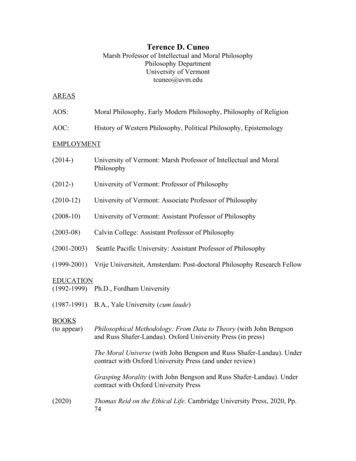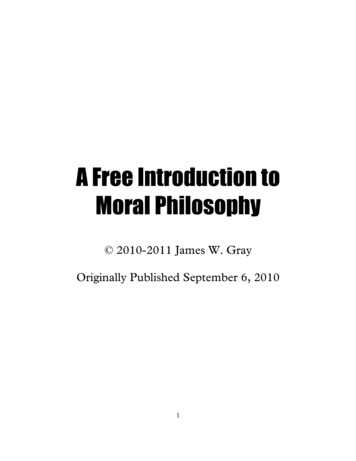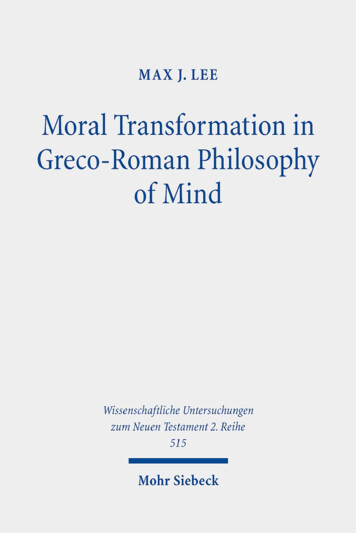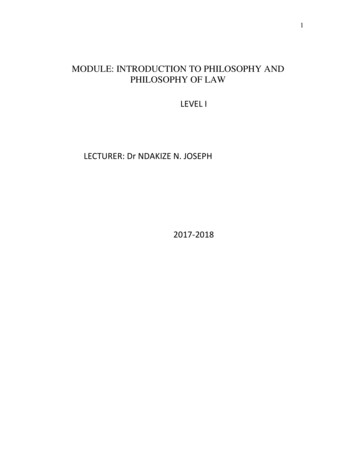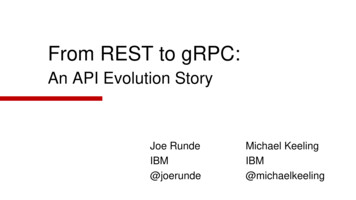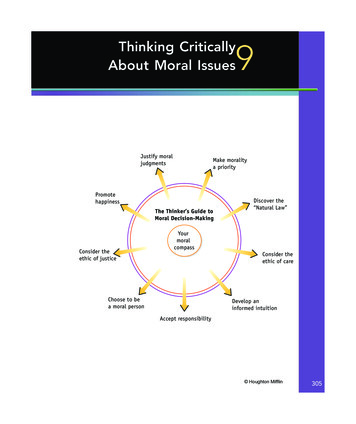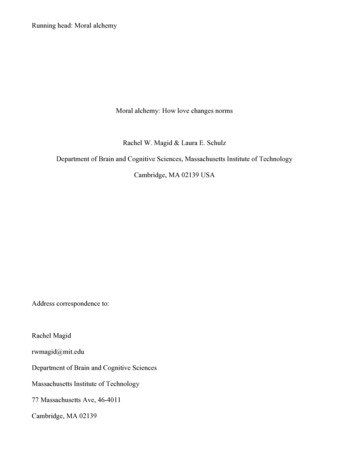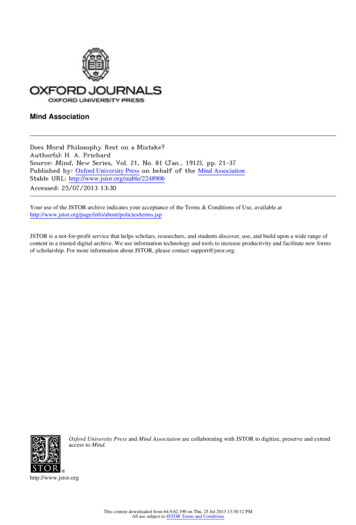
Transcription
Mind AssociationDoes Moral Philosophy Rest on a Mistake?Author(s): H. A. PrichardSource: Mind, New Series, Vol. 21, No. 81 (Jan., 1912), pp. 21-37Published by: Oxford University Press on behalf of the Mind AssociationStable URL: http://www.jstor.org/stable/2248906 .Accessed: 25/07/2013 13:30Your use of the JSTOR archive indicates your acceptance of the Terms & Conditions of Use, available at ms.jsp.JSTOR is a not-for-profit service that helps scholars, researchers, and students discover, use, and build upon a wide range ofcontent in a trusted digital archive. We use information technology and tools to increase productivity and facilitate new formsof scholarship. For more information about JSTOR, please contact support@jstor.org.Oxford University Press and Mind Association are collaborating with JSTOR to digitize, preserve and extendaccess to Mind.http://www.jstor.orgThis content downloaded from 64.9.62.190 on Thu, 25 Jul 2013 13:30:12 PMAll use subject to JSTOR Terms and Conditions
II.-DOESMORAL PHILOSOPHYMISTAKE?BY H. A.REST ON APRICHARD.to most studentsof Moral Philosophytherecomesa time when theyfeel a vague sense of dissatisfactionwiththe whole subject.- And the sense of dissatisfactiontends togrow rather than to diminish. It is not so much that,thepositions,and stillmore the arguments,of particularthinkersseem unconvincing,though this is true. It is rather thatthe aim ofthe subjectbecomes increasinglyobscure. " What,"it is asked, "are we really going to leaxn by Moral Philosophy ? " " What are books on Moral Philosophyreallytryingto show, and when their aim is clear, why Ere they so unconvincing and artificial?" And again: "Why is it sodifficultto substituteanythingbetter?" Personally,I havebeen led by growing dissatisfactionof this kind to wonderwhetherthe reason may not be that the subject, at any rateas usually understood,consists in the attempt to answer animproperquestion. And in this article,I shall venture tocontend that the existence of the whole subject, as usuallyunderstood, rests on a mistake, and on a mistake parallelto that on which rests, as I think,the subject usually calledthe Theory of Knowledge.If we reflecton our own mental historyor on the historyof the subject, we feel no doubt about the nature of thedemand which originatesthe subject. Any one who, stimulated by education,has come to feel the force of the variousobligations in life,at solne time or other comes to feel theirksomenessof carryingthem out, and to recognisethe sacrifice of interestinvolved; and, if thoughtful,be inevitablyputs to himselfthe question " Is there really a reason whyI should act in the ways in which hithertoI have thought Iought to act ? May I not have been all the time under anillusion in so thinking? Should not I really be justifiedinsimply tryingto have a good time?" Yet, like Glaucon,feelingthat somehow he ought afterall to act in these ways,he asks for a proof that this feelingis justified. In otherPROBABLYThis content downloaded from 64.9.62.190 on Thu, 25 Jul 2013 13:30:12 PMAll use subject to JSTOR Terms and Conditions
22H. A. PRICHARD:words, he asks " WVhyshould I do these things? " and,hisand other people's moral philosophising is an attempt tosupplythe answer, i.e. to supply by a process of reflexionaproofofthe truthofwhat he and they have priorto reflexionor withoutproof. This frameof mindbelievedimmnediatelyseems to presenta close parallel to the frame of mind whichoriginatesthe Theoryof Knowledge. Justas the recognitionthat the doing of our duty oftenvitallyinterfereswith thesatisfactionof our inclinations leads us to wonder whetherwe really ought to do what we usually call our duty,so therecognition that we and others are liable to mistakes inknowledgegenerallyleads us, as it did Descartes, to wonderwhetherhithertowe may not have been always mistaken.And just as we tryto finda proof,based on the general considerationof action and of human life,that we ought to actin the ways usually called moral, so we, like Descartes, propose by a process of reflexionon our thinking t,ofinda testof knowledge, i.e. a principle by applying which we canshow that a certain conditionof mind was reallyknowledge,a conditionwhich ex hypothesiexisted independentlyof theprocess of reflexion.Now, how has the moralquestionbeen answered? So farasI can see,the answersall fall,andfallfromthe necessitiesofthecase, into one of two species. Eithertheystate that we oughtto do so and so, because, as we see wheinwe fullyapprehendthe facts,doing so will be forour good, i.e. really,as I wouldrathersay, forour advantage, or, better still,for our happiness; or they state that we ought to do so and so, becausesomethingrealised either in or by the action is good. Inother words,the reason 'why' is stated in terms eitherofinthe agent's happiness or of the goodness of somuethingvolved in the action.To see the prevalenceof the formerspecies of answer, wehave only to considerthe historyof Moral Philosophy. Totake obvious instances, Plato, Butler, Hutcheson, Paley,Mill, each in his own way seeks at bottomto convince theindividual that he ought to act in so-called moral ways byshowing that to do so will really be for his happiness.Plato is perhaps the most significantinstance,because of allphilosophershe is the one to whom we are least willingtoascribea mistake on such matters,and a mistake on his partwould be evidence of the deep-rootednessof the tendencytomake it. To show that Plato really justifiesmoralityby itsprofitableness,it is only necessary to point out (1) that theveryformulationof the thesis to be met,viz., that justice ismustconsistinaXXO-prtova4ryaOv, impliesthatanyrefutationThis content downloaded from 64.9.62.190 on Thu, 25 Jul 2013 13:30:12 PMAll use subject to JSTOR Terms and Conditions
DOES MORAL PHILOSOPHYREST ON A MISTAKE?23showing that justice is ObcELOV aya06v, i.e. really, as thecontextshows, one's own advantage, and (2) that the termXvrTEXELzv supplies the keynotenot only to the problem butalso to its solution.The tendency to justifyacting on moral rules in this wayis natural. For if, as oftenhappens, we put to ourselves thequestion " Why should we do so and so? " we are satisfiedby being convincedeitherthat the doing so will lead to something which we want (e.g. that taking certain medicine will'heal our disease), or that the doing so itself,as we see whenwe appreciateits nature,is somethingthat we want or shouldlike, e.g. playing golf. The formulation of the questiontowards theimplies a state of unwillingness or indifferenceaction, and we are broughtinto a conditionof willingnessbythe answer. And this process seems to be preciselywhat wedesire when we ask, e.g., "Why should we keep our engagementsto our own loss? " forit is just the fact that thekeeping our engagements runs counter to the satisfactionofour desireswhich produced the question.The answer is, of course,not an answer, forit fails to convince us that we ought to keep our engagements; even ifsuccessful on its own lines,it only makes us want to keepthem. And Kant was really only pointingout this factwhenhe distinguishedhypothetical and categorical imperatives,even though he obscured the nature of the fact by wronglydescribing his so-called 'hypothetical imperatives' as imperatives. But if this answer be no answer, what other canbe offered? Only, it seems, an answer which bases theobligation to do something on the goodnesseither of something to which the act leads or of the act itself. Suppose,when wonderingwhetherwe reallyought to act in the waysusually called moral, we are told as a means of resolvingour doubt that those acts are rightwhich produce happiness.We at once ask " Whose happiness?" If we are told " Ourown happiness," then, though we shall lose our hesitationtoact in these ways, we shall not recover our sense that weought to do so. But how can this result be avoided?Apparently,only by being told one of two things ; eitherthatany one's happiness is a thing good in itself,and that therefore we ought to do whatever will produce it, or that theworking for happiness is itself good, and that the intrinsicgoodness of such an action is the reason why we ougrhtto doit. The advantage of this appeal to the goodness of something consists in the fact that it avoids referenceto desire,and, instead, refersto something impersonal and objective.In this way it seems possible to avoid the resolution ofThis content downloaded from 64.9.62.190 on Thu, 25 Jul 2013 13:30:12 PMAll use subject to JSTOR Terms and Conditions
24H. A. PRICHARD:obligationinto inclination. But just forthis reason it is ofthe essence of the answer, that, to be effective,it mustneitherincludenor involve the view that the apprehensionofthe goodness of anythingnecessarilyarouses the desireforit.Otherwisethe answer resolves itselfintoa formof the formeranswer by substitutingdesire or inclination forthe sense ofobligation, and in this way it loses what seems its specialadvantage.Now it seems to me that both formsof this answer breakreason.down, though each fora differentConsider the firstform. It is what may be called Utilitarianism in the generic sense in which what is good is notlimited to pleasure. It takes its stand upon the distinctionbetween something which is not itself an action but whichcan be producedby an action and the action which will produce it, and contends that if something which is not anaction is good, then we oughtto undertakethe action whichwill, directlyor indirectly,originateit.'But this argument,if it is to restorethe sense of obligation to act, must presuppose an intermediatelink, viz., thefurtherthesis that what is good oughtto be.2 The necessityof this link is obvious. An ' ought,'if it is to be derived atall, can only be derived from another 'ought'. Moreoverthis link tacitlypresupposes another,viz., that the apprehension that somethinggood which is not an action ought to beinvolves just the feelingof imperativenessor obligationwhichis to be aroused by the thought of the action which willoriginate it. Otherwise the argument will not lead us tofeel the obligationto produce it by the action. And, surely,both this link and its implication are false. The word' ought' refersto actions and to actions alone. The properlanguage is never " So and so ought to be, but " I ought todo so and so '. Even if we are sometimesmoved to say thatthe world or somethingin it is not what it ought to be, whatwe reallymean is that God or some human being has notmade somethingwhat he ought to have made it. And it ismerelystating another side of this fact to urge that we canonly feel the imperativenessupon us of something which isin our power; for it is actions and actions alone which,directlyat least, are in our power.1 Cf. Dr. Rashdall'sTheory of Good and Evil, vol. i., p. 138.Rashdall, if I understand him rightly, supplies this link (cf.Theory of Good and Evil, vol. i., pp. 135-136).3When we speak of anything,e.g. of some emotion or of some qualityofa human being, as good, we never dream in our ordinary consciousnessof going on to say that thereforeit ought to be.2Dr.This content downloaded from 64.9.62.190 on Thu, 25 Jul 2013 13:30:12 PMAll use subject to JSTOR Terms and Conditions
DOES MORAL PHILOSOPHYREST ON A MISTAKE?25Perhaps, however,the best way to see the failureof thisview is to see its failure to correspondto our actual moralconvictions. Suppose we ask ourselves whether our sensethat we ought to pay our debts or to tell the trutharisesfromour recognitionthat in doing so we should be originating something good, e.g., material comfort in A or truebeliefin B, i.e., suppose we ask ourselves whetherit is thisaspect of the action which leads to our recognition that weought to do it. We, at once, and without hesitation answer'No'.Again, if we take as our illustrationour sense thatwe ought to act justly as between two parties,we have, ifpossible, even less hesitationin givinga similar answer; forthe balance of resulting good may be, and often is, not onthe side of justice.At best it can onlybe maintainedthat thereis this elementof truth in the Utilitarian view that unless we recognisedthat somethingwhich an act will originateis good,we shouldnot recognise that we ought to do the action. Unless wethoughtknowledgea good thing,it may be urged, we shouldnot thinkthat we ought to tell the truth; unless we thoughtpain a bad thing,we should not think the inflictionof it,withoutspecial reason, wrong. But this is not to implythatthe badness of erroris the reason why it is wrong to lie, orthe badness of pain the reason why we ought not to inflictitwithoutspecial cause.'It is, I -think, just because this form of the view is soplainly at variance with our moral consciousness, that webecome driven to adopt the other form of the view, viz.,that the act is good in itselfand that its intrinsic goodnessis the reason why it ought to be done. It is this formwhichhas always made the most serious appeal; forthe goodnessof the act itselfseems more closely related to the obligationto do it than that ofitsmereconsequences or results,and therefore,if obligation is to be based on the goodness of something,it would seem that this goodnessshould be that of theact itself. Moreover, the view gains plausibilityfrbmthefact that moral actions are most conspicuously those towhich the term'intrinsicallygood' is applicable.Nevertheless this view, though perhaps less superficial,is equally untenable. For it leads to preciselythe dilemmawhich faces everyone who tries to solve the problemraisedI It may be noted that if the badness of pain were the reason why weought not to inflictpain on another, it would equally be a reason why weought nvt to inflictpain on ourselves; yet, though we should allow thewanton infliction of pain on ourselves to be foolish, we should not thinkof describing it as wrong.This content downloaded from 64.9.62.190 on Thu, 25 Jul 2013 13:30:12 PMAll use subject to JSTOR Terms and Conditions
26H. A. PRICHARD:by Kant's theoryof the good will. To see this, we needonly consider the nature of the acts to which we apply theterm 'intrinsicallygood'.There is, of course, no doubt that we approve and evenadmire certain actions, and also that we should describethem as good, and as good in themselves. But it is, I think,equally unquestionable that our approval and our use of theterm ' good' is always in respect of the motiveand referstoactions which have been actually done and of which wethinkwe know ihe motive. Further, the actions of whichwe approve and which we should describe as intrinsicallygood are of two and only two kinds. They are eitheractionsin which the agent did what he did because he thoughtheought to do it, or actions of which the motive was a desireprompted by some good emotion, such as gratitude,affection, familyfeeling,or public spirit,the most prominentofsuch desires in books on Moral Philosophy being that ascribedto what is vaguelycalled benevolence. For the sake ofsimplicityI omit the case of actions done partlyfrom somesuch desire and partly from a sense of duty; foreven if allgood actions are done from a combinationof these motives,the argumentwill not be affected. The dilemma is this. Ifthe motivein respect of which we think an action good isthe sense of obligation,then so far from the sense that weought to do it being derived from our apprehension of itsgoodness, our apprehension of its goodness will presupposethe sense that we ought to do it. In other words, in thiscase the recognitionthat the act is good will plainly presupposethe recognition that the act is right, whereas theview under considerationis that the recognitionof the goodness of the act gives rise to the recognitionof its rightness.On the other hand, if the motive in respect of which wethinkan action good is some intrinsicallygood desire,suchas the desire to help a friend,the recognitionof the goodnessof the act will equally fail to give rise to the sense of obligation to do it. For we cannot feel that we ought to do thatthe doing of which is ex hypothesiprompted solely by thedesire to do it.'The fallacy underlyingthe view is that while to base therightnessof an act upon its intrinsicgoodness implies that'the goodness in question is that of the motive,in realitytherightness or wrongness of an act has nothing to do withany question of motives at all. For, as any instance willshow, the rightness of an action concerns an action not inIIt is, I think,on this latterhorn of the dilemmathat Martineau'sviewfalls; cf. TypesofEthical Theory,partii., book i.This content downloaded from 64.9.62.190 on Thu, 25 Jul 2013 13:30:12 PMAll use subject to JSTOR Terms and Conditions
DOES MORAL PHILOSOPHYREST ON A MISTAKE ?27the fullersense of the term in which we include the motivein the action,but in the narrower and commoner sense inwhich we distinguishan action fromits m-otiveand mean byan action merely the conscious origination of something,an originationwhich on differentoccasions or in differentmotives. The questionpeople may be promptedby different" Ought I to pay my bills ? " really means simply " Ought Ito bring about my tradesmen's possession of what by myprevious acts I explicitly or implicitlypromised them? "There is, and can be, no question of whetherI ought to paymy debts froma particularmotive. No doubt we know thatif we pay our bills we shall pay them with a motive,but inconsideringwhetherwe oughtto pay themwe inevitablythinkof the act in abstractionfromthe motive. Even if we knewwhat our motivewould be ifwe did the act, we should not beany nearer an answer to the question.Moreover,if we eventuallypay our bills from fear of thecountycourt,we shall still have done what we ought, eventhough we shall not have done it as we ought. The attemptto bring in the motive involves a mistake similar to thatinvolved in supposing that we can will to will. To feel thatI ought to pay my bills is to be movedtowardspaying them.But what I can be moved towards must always be an actionand not an action in which I am moved in a particularway,i.e. an action from a particularmotive; otherwise I shouldbe moved towardsbeing moved,which is impossible. Yet theview under considerationinvolves this impossibility; for itreallyresolves the sense that I ought to do so and so, into thesense that I ought to be moved to do it. in a particularway.'So far my contentionshave been mainlynegative,but they'form,I think, a useful,if not a necessary, introductiontowhat I take to be the truth. This I will now endeavourto state, firstformulatingwhat, as I think,is the real natureof our apprehensionor appreciationof moral obligations,andthen applyingthe resultto elucidate the question of the existence of Moral Philosophy.The sense of obligation to do, or of the rightness of, anaction of a particular kind is absolutely underivative orimmediate. The rightnessof an action consistsin its beingthe originationof somethingof a certainkindA in a situationof a certainkind, a situation consisting in a certain relationB of the agent to othersor to his own nature. To appreciateits rightnesstwo preliminariesmay be necessary. We may1 It is of course not denied here that an action done froma particularmotive may be good; it-is only denied that the rightnessof an actiondepends on its being done with a particular motive.This content downloaded from 64.9.62.190 on Thu, 25 Jul 2013 13:30:12 PMAll use subject to JSTOR Terms and Conditions
28H. A. PRICHARD:have to follow out the consequences of the proposed actionmore fully than we have hithertodone, in order to realisethat in the action we should originateA. Thus we may notappreciate the wrongness of tellinga certain storyuntil werealise that we should therebybe hurtingthe feelingsof oneof our audience. Again, we may have to take into accountthe relation B involved in the situation, which we hadhithertofailedto notice. For instance,we may not appreciatethe obligation to give X a present,until we rememberthathe has done us an act of kindness. But, given that by aprocess which is, of course,merelya process of general andnot of moral thinkingwe come to recognisethat the proposedact is one by which we shall originateA in a relationB, thenwe appreciate the obligation immediately or directly,theappreciation being an activityof moral thinking. We recognise, for instance, that this performance of a serviceto X, who has done us a service,just in' virtueof its beingthe performance of a service to one who has rendereda service to the would-be agent, ought to be done by us.This apprehension is immediate, in precisely the sense inwhich a mathematical apprehensionis immediate, e.g., theapprehension that this three-sidedfigure,in virtue of itsbeing three-sided,must have three angles. Both apprehensions are immediatein the sense that in both insightinto thenature of the subject directlyleads us to recogniseits possession of the predicate; and it is only stating this fact fromthe otherside to say that in both cases the fact apprehendedis self-evident.The plausibility of the view that obligationsare not selfevident but need proof lies in the fact that an act which isreferredto as an obligationmay be incompletelystated,whatI have called the preliminariesto appreciatingthe obligationbeing incomplete. If, e.g.,we referto the act of repaying Xby a present merely as giving X a present,it appears, andindeedis, necessaryto give a reason. In otherwords,wherevera moral act is regardedin this incompleteway the question," Why should I do it? " is perfectlylegitimate. This factsuggests,but suggests wrongly,that even if the natureof theact is completelystated,it is still necessary to give a reason,or,in otherwords,to supply a proof.The relationsinvolvedin obligationsof various kinds, are,of course,verydifferent. The relation in certain cases is arelation to others due to a past act of theirsor ours. Theobligation to repay a benefitinvolves a relationdue to a pastact of the benefactor. The obligationto pay a bill involves a-retationdue to a past of ours in which we have eithersaid orThis content downloaded from 64.9.62.190 on Thu, 25 Jul 2013 13:30:12 PMAll use subject to JSTOR Terms and Conditions
DOES MORAL PHILOSOPHYREST ON A MISTAKE ?29implied that we would make a certain return,forsomethingwhich we have asked forand received. On the other handthe obligationto speak the truthimpliesno such definiteact;it involves a relation consisting in the fact that othersaretrustingus to speak the truth,a relationthe apprehensionofwhich gives rise to the sense that communicationof the truthis somethingowing by us to them. Again the obligationnotto hurtthe feelingsof another,involves no special relationofus to that other,i.e., no relation otherthan that involved inour both being men and men in one and the same world.Moreover,it seems that the relationinvolvedin an obligationneed not be a relation to another at all. Thus we shouldadmit that there is an obligation to overcome our naturaltimidityor greediness,and that this involves no relations toothers. Still there is a relation involved,viz., a relation toour own disposition. It is simplybecause we can and becauseothers cannot directlymodifyour disposition that it is ourbusiness to improveit, and that it is not theirs,or, at least,not theirsto the same extent.The negative side of all this is, of course, that we do notcome to appreciatean obligationby an argument,i.e.bya processof non-moralthinking,and that, in particular,we do not doso by an argumentof which a premise is the ethical but notmoral activityof appreciatingthe goodness eitherof the act orof a consequence of the act; i.e. that our sense of the rightour appreciationofness of an act is not a conclusion fromnthe goodness eitherof it or of anythingelse.It will probablybe urgedthat on this view our various obligations form,like Aristotle'scategories, an unrelated chaosin which it is impossible to acquiesce. For, according to it,the obligationto repay a benefit,or to pay a debt,or to keep apromise,presupposesa previous act of another; whereas theobligationto speak the truthor not to harm anotherdoes not;and, again, the obligationto remove our timidityinvolves norelations to others at all. Yet, at any rate, an effectiveargumentumad hominem is at hand in the fact that the variousqualities which we recognise as good are equally unrelated;e.g. courage, humility,and interest in knowledge. If, as isplainly the case, adyaOa differj' 'yaOac, why should not obligations equally differqua theirobligatoriness? Moreover ifthis were not so, therecould in the end be onlyone obligation,which is palpably contraryto fact.'' Two other objections may be anticipated: (1) that obligations cannotbe self-evident,since many actions regarded as obligations by some arenot so regarded by others; and (2) that if obligations are self-evident,This content downloaded from 64.9.62.190 on Thu, 25 Jul 2013 13:30:12 PMAll use subject to JSTOR Terms and Conditions
30H. A. PRICHARD:Certainobservationswill help to make the view clearer.In the firstplace,it may seem that the view,being-as it is-avowedly put forwardin oppositiontothe view that what isright is derivedfromwhat is good, must itself involve theoppositeof this, viz., the Kantian position that what is goodis based upon what is right,i.e., that an act, if it be good, isgood because it is right. But this is not so. For, on theview put forward,the rightnessof a rightaction lips solelyin the origination in which the act consists, whereas theintrinsicgoodness of an action lies solely in its motive; andthis implies that a morallygood action is morallygood notsimplybecause it is a right action but because it is a rightaction done because it is right,i.e., froma sense of obligation.And this implication,it may be remarkedincidentally,seemsplainly true.In the second place the view involves that,when, or ratherso far as, we act froma sense of obligation,we have no purpose or end. By a 'purpose' or 'end' we reallymean something the existence of which we desire, and desire of theexistence of which leads us to act. Usually our purpose issomethingwhichthe act will originate,as whenwe turnroundin order to look at a picture. But it may be the actionitself,i.e., the originationof something,as when we hit a golfballinto a hole or kill some one out of revenge.' Now if by apurpose we mean something the existence of which wedesire and desire for which leads us to act, then plainly sothe problemofhowwe oughtto act in the presenceofconflictingobligationsis insoluble.To the firstI shouldreply(a) That the appreciationofan obligationis, of course,onlypossiblefora developedmoralbeing,and thatdifferentdegreesof developmentare possible.(b) That the failureto recognisesome particularobligationis usuallydue to the factthat,owingto a lackofthoughtfulness,whatI havecalledto thisrecognitionare incomplete.the preliminaries(c) That the view put forwardis consistentwith the admissionthat,even the best menare blindto manyowingto a lack ofthoughtfulness,oftheir obligations,and that in the end our obligationsare seen to bewithalmostthe wholeofourlife.co-extensiveTo the secondobjectionI should reply that obligationadmitsof degrees,and thatwhereobligationsconflict,the decisionofwhatwe ought" Whichofthealternativeto do turnsnoton thequiestioncoursesofactionwilloriginatethe greatergood?" but on the question "Which is thegreaterobligation?", It is no objectionto urge that an action cannotbe its ownpurpose,cannotbe thethingitself. For, speakingsincethe purposeof somethingstrictly,the purposeis not the action'spurpose but our-purpose,andin holdingthat our purposein actingmaybethere is no contradictionthe action.This content downloaded from 64.9.62.190 on Thu, 25 Jul 2013 13:30:12 PMAll use subject to JSTOR Terms and Conditions
DOES MORAL PHILOSOPHYRESTON A MISTAKE?31far as we act froma sense of obligation,we have no purpose,consisting eitherin the action itselfor in anything which itwill produce. This is so obvious that it scarcelyseems worthpointingout. But I do so fortwo reasons. (1) If we fail toscrutinisethe meaning of the terms 'end' and 'purpose,' weare apt to assume uncriticallythat all deliberateaction, i.e.,action proper,must have a purpose; we then become puzzledboth whernwe look forthe purpose of an action done fromasense ofobligation,and also when we tryto apply to such anaction the distinction of means and end, the truth all thetime being that since there is no end, there is no meanseither. (2) The attempt to base the sense of obligationonthe recognition of the goodness of something is really anattemptto finda purpose in a moral action in the shape ofsomethinggood which, as good, we want. And the expectation that the goodness of somethingunderliesan obligationdisappears as soon as we cease to look fora purpose.The thesis, however,that, so far as we act froma senseof obligation,we have no purposemust not be misunderstood.It must not be taken eitherto mean or to implythat so faras we so act we have no motive. No doubt in ordinaryspeech the words ' motive' arnd' purpose ' are usuallytreatedas correlatives,'motive' standing for the desire which induces us to act, and 'purpose' standing for the object ofthis desire. But this is only because, when we are lookingforthe motive of some action,say some crime,we are usuallypresupposing that the act in question is prompted by adesire and not by the sense of obligation. At bottom, however, we mean by a motive what moves us to act; a senseof obligation does sometimes move us to act; and in ourordinary consciousness we should not hesitate to allowthat the action we were consideringmight have had as itsmotivea sense of obligation. Desire and the sense of obligation are co-ordinateformsor species of motive.In the third place, if the view put forwardbe right, wemust sharplydistinguishmoralityand virtueas independent,though related, species of goodness, neitherbeing an aspectof some
24 H. A. PRICHARD: obligation into inclination. But just for this reason it is of the essence of the answer, that, to be effective, it must neither include nor involve the view that the apprehension of the goodness of anything necessarily arouses the desire for it. Otherwise the answer resolves itself into a form of the former

